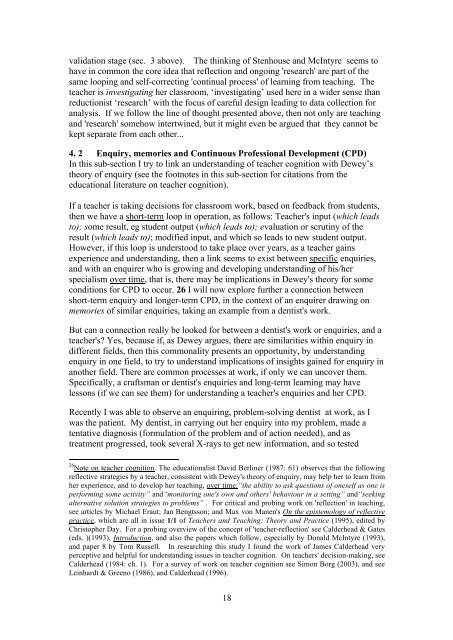RADICAL TEFL
2hqhXJd
2hqhXJd
Create successful ePaper yourself
Turn your PDF publications into a flip-book with our unique Google optimized e-Paper software.
validation stage (sec. 3 above). The thinking of Stenhouse and McIntyre seems to<br />
have in common the core idea that reflection and ongoing 'research' are part of the<br />
same looping and self-correcting 'continual process' of learning from teaching. The<br />
teacher is investigating her classroom, ‘investigating’ used here in a wider sense than<br />
reductionist ‘research’ with the focus of careful design leading to data collection for<br />
analysis. If we follow the line of thought presented above, then not only are teaching<br />
and 'research' somehow intertwined, but it might even be argued that they cannot be<br />
kept separate from each other...<br />
4. 2 Enquiry, memories and Continuous Professional Development (CPD)<br />
In this sub-section I try to link an understanding of teacher cognition with Dewey’s<br />
theory of enquiry (see the footnotes in this sub-section for citations from the<br />
educational literature on teacher cognition).<br />
If a teacher is taking decisions for classroom work, based on feedback from students,<br />
then we have a short-term loop in operation, as follows: Teacher's input (which leads<br />
to); some result, eg student output (which leads to); evaluation or scrutiny of the<br />
result (which leads to); modified input, and which so leads to new student output.<br />
However, if this loop is understood to take place over years, as a teacher gains<br />
experience and understanding, then a link seems to exist between specific enquiries,<br />
and with an enquirer who is growing and developing understanding of his/her<br />
specialism over time, that is, there may be implications in Dewey's theory for some<br />
conditions for CPD to occur. 26 I will now explore further a connection between<br />
short-term enquiry and longer-term CPD, in the context of an enquirer drawing on<br />
memories of similar enquiries, taking an example from a dentist's work.<br />
But can a connection really be looked for between a dentist's work or enquiries, and a<br />
teacher's? Yes, because if, as Dewey argues, there are similarities within enquiry in<br />
different fields, then this commonality presents an opportunity, by understanding<br />
enquiry in one field, to try to understand implications of insights gained for enquiry in<br />
another field. There are common processes at work, if only we can uncover them.<br />
Specifically, a craftsman or dentist's enquiries and long-term learning may have<br />
lessons (if we can see them) for understanding a teacher's enquiries and her CPD.<br />
Recently I was able to observe an enquiring, problem-solving dentist at work, as I<br />
was the patient. My dentist, in carrying out her enquiry into my problem, made a<br />
tentative diagnosis (formulation of the problem and of action needed), and as<br />
treatment progressed, took several X-rays to get new information, and so tested<br />
26 Note on teacher cognition. The educationalist David Berliner (1987: 61) observes that the following<br />
reflective strategies by a teacher, consistent with Dewey's theory of enquiry, may help her to learn from<br />
her experience, and to develop her teaching, over time:“the ability to ask questions of oneself as one is<br />
performing some activity” and“monitoring one's own and others' behaviour in a setting” and“seeking<br />
alternative solution strategies to problems” . For critical and probing work on 'reflection' in teaching,<br />
see articles by Michael Eraut; Jan Bengtsson; and Max von Manen's On the epistemology of reflective<br />
practice, which are all in issue 1/1 of Teachers and Teaching: Theory and Practice (1995), edited by<br />
Christopher Day. For a probing overview of the concept of 'teacher-reflection' see Calderhead & Gates<br />
(eds. )(1993), Introduction, and also the papers which follow, especially by Donald McIntyre (1993),<br />
and paper 8 by Tom Russell. In researching this study I found the work of James Calderhead very<br />
perceptive and helpful for understanding issues in teacher cognition. On teachers' decision-making, see<br />
Calderhead (1984: ch. 1). For a survey of work on teacher cognition see Simon Borg (2003), and see<br />
Leinhardt & Greeno (1986), and Calderhead (1996).<br />
18


